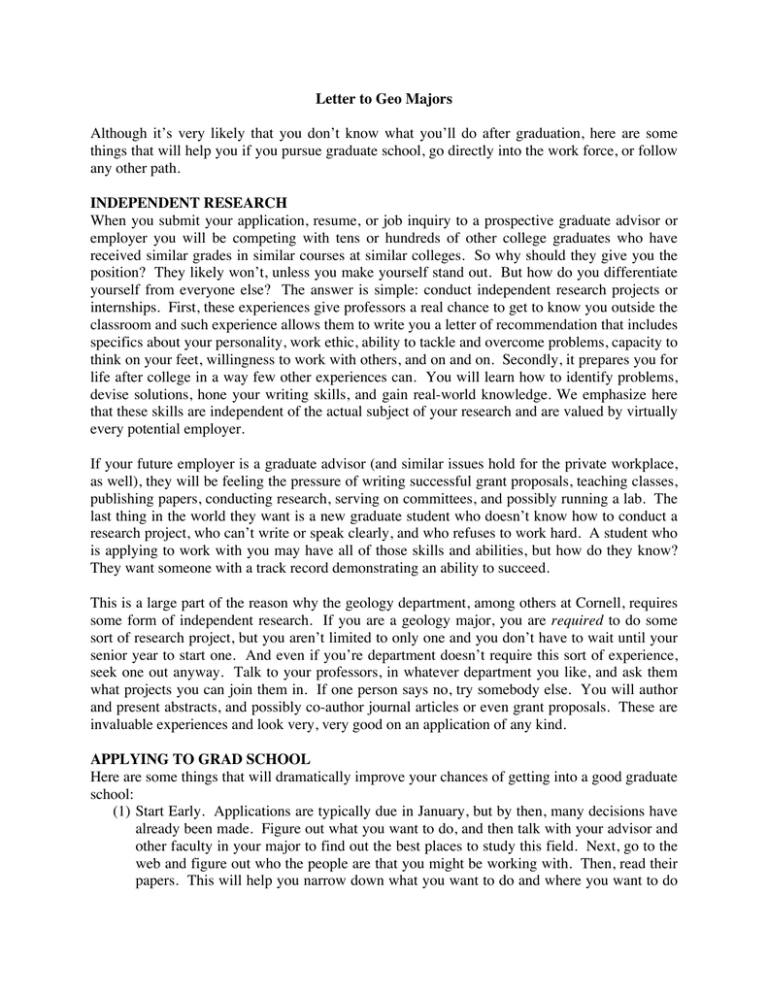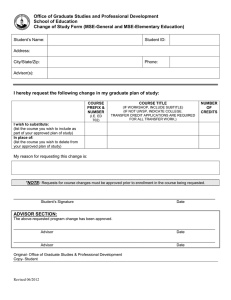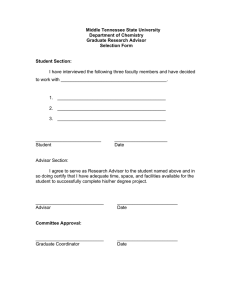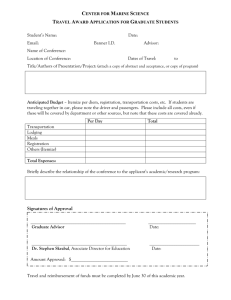Letter to Geo Majors
advertisement

Letter to Geo Majors Although it’s very likely that you don’t know what you’ll do after graduation, here are some things that will help you if you pursue graduate school, go directly into the work force, or follow any other path. INDEPENDENT RESEARCH When you submit your application, resume, or job inquiry to a prospective graduate advisor or employer you will be competing with tens or hundreds of other college graduates who have received similar grades in similar courses at similar colleges. So why should they give you the position? They likely won’t, unless you make yourself stand out. But how do you differentiate yourself from everyone else? The answer is simple: conduct independent research projects or internships. First, these experiences give professors a real chance to get to know you outside the classroom and such experience allows them to write you a letter of recommendation that includes specifics about your personality, work ethic, ability to tackle and overcome problems, capacity to think on your feet, willingness to work with others, and on and on. Secondly, it prepares you for life after college in a way few other experiences can. You will learn how to identify problems, devise solutions, hone your writing skills, and gain real-world knowledge. We emphasize here that these skills are independent of the actual subject of your research and are valued by virtually every potential employer. If your future employer is a graduate advisor (and similar issues hold for the private workplace, as well), they will be feeling the pressure of writing successful grant proposals, teaching classes, publishing papers, conducting research, serving on committees, and possibly running a lab. The last thing in the world they want is a new graduate student who doesn’t know how to conduct a research project, who can’t write or speak clearly, and who refuses to work hard. A student who is applying to work with you may have all of those skills and abilities, but how do they know? They want someone with a track record demonstrating an ability to succeed. This is a large part of the reason why the geology department, among others at Cornell, requires some form of independent research. If you are a geology major, you are required to do some sort of research project, but you aren’t limited to only one and you don’t have to wait until your senior year to start one. And even if you’re department doesn’t require this sort of experience, seek one out anyway. Talk to your professors, in whatever department you like, and ask them what projects you can join them in. If one person says no, try somebody else. You will author and present abstracts, and possibly co-author journal articles or even grant proposals. These are invaluable experiences and look very, very good on an application of any kind. APPLYING TO GRAD SCHOOL Here are some things that will dramatically improve your chances of getting into a good graduate school: (1) Start Early. Applications are typically due in January, but by then, many decisions have already been made. Figure out what you want to do, and then talk with your advisor and other faculty in your major to find out the best places to study this field. Next, go to the web and figure out who the people are that you might be working with. Then, read their papers. This will help you narrow down what you want to do and where you want to do it. Only then should you send a prospective graduate advisor a letter. The first time your prospective advisor hears of you, it will be in the form of a well-written email in which you say that you’ve read their papers and want to work with them. You’ll also tell them a little of your history (school, major, GPA, research history, etc.). They will respond to let you know if they’re taking on any students, whether they’ve got financial support for new students, what sort of projects they’re interested in advising, and on and on. You need to interview them as much as they interview you. (2) Study for the GRE. Buy a book, study, and do well.




